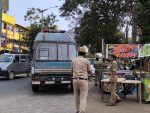
Scientists find evidence of ‘substantial’ transmission of monkeypox even before symptoms appear
PTI, Nov 3, 2022, 3:56 PM IST

Representational Image
London: Scientists have found evidence to show that the monkeypox virus can spread from an infected person up to four days before they even start exhibiting symptoms of the disease, a new study has claimed.
The researchers behind the study estimated that 53 per cent of the transmission of monkeypox occurred in this pre-symptomatic phase, meaning that many infections cannot be prevented by asking individuals to isolate after they notice their symptoms.
According to them, if these findings published in the British Medical Journal are supported by other studies, pre-symptomatic transmission “would have important implications for infection control globally”.
While previous research on pox viruses did not rule out transmission prior to symptoms, this work represents the first evidence to support this. To explore this further, researchers at the United Kingdom Health Security Agency set out to analyse the transmission dynamics of the monkeypox outbreak in the country, the study said.
The two main measures of interest to the researchers were serial interval – the time from symptom onset in the primary case patient to symptom onset in the secondary contact – and incubation period – the time from exposure to onset of symptoms.
The mean incubation period was estimated to be 7.6 days in one model and 7.8 days in the other model, while the estimated mean serial interval was eight days in one model and 9.5 days in the other.
For both models, the median serial interval was between 0.3 and 1.7 days shorter than the median incubation period, indicating that considerable transmission is occurring before the appearance or detection of symptoms.
Their findings are based on routine surveillance and contact-tracing data for 2,746 individuals who tested positive for the monkeypox virus in the UK between May 6 and August 1, 2022. Their average age was 38 years and 95 per cent of them reported being gay, bisexual, or men who have sex with men, the study mentioned.
To estimate the above values, the scientists linked information on exposure and symptom onset dates from these individuals to their contacts through contact-tracing case questionnaires, which they then analysed using two statistical models.
The models were adjusted for several biases common to virus outbreaks, such as changes in infection rates over time, that would otherwise affect the results.
Analysis of individual-level patient data, collected from a subset of patients with more detailed information, seemed to confirm this explanation, with 10 out of 13 case-contact patient pairs reporting pre-symptomatic transmission. Four days was the maximum time that transmission was detected before symptoms appeared.
Based on these results, the researchers say an isolation period of 16 to 23 days would be required to detect 95 per cent of people with a potential infection.
These are observational findings, and the researchers point to several limitations, such as relying on contact tracing to identify the correct case-contact pairs and the self-reported data on the date of symptom onset. Further, the results may not necessarily be directly applicable to other populations with different transmission patterns.
Nevertheless, this was a large study using robust methods and adjusting for key biases that are present in the data, providing greater confidence in the conclusions.
These findings have important implications for isolation and contact-tracing policies, the researchers said, adding that backward contact-tracing strategies (tracing from whom disease spreads) should account for a pre-symptomatic infectious period when trying to find the contacts of confirmed cases.
In a linked editorial, researchers based in the US, UK, and Nigeria argued that pre-exposure vaccination and vaccine equity are urgently needed worldwide.
Vaccination is likely to be more cost-effective than managing the consequences of preventable infections, including hospital admissions, loss of income during isolation, and long-term complications, they explained.
However, they pointed out that many of the public health measures that have been critical during monkeypox outbreaks in high-income countries remain unavailable in much of Africa.
“As the monkeypox outbreak declines in Europe and North America, we have a responsibility to deploy effective tools for viral control on a global level – not just in wealthy nations,” the researchers said. “These tools include research into understanding transmission dynamics in African settings and the inclusion of endemic countries in vaccine trials.” Although case numbers are now declining, it is still important to understand the “transmission dynamics” of the virus – for example, how it spreads from one person to another and how quickly symptoms appear – to help inform policy decisions and future interventions.
Since the international outbreak of monkeypox in May 2022, more than 70,000 cases have been recorded globally, with just over 3,500 cases in the UK.
Udayavani is now on Telegram. Click here to join our channel and stay updated with the latest news.
Top News
Related Articles More

Surgical options for Parkinson’s disease

Breast cancer to cause a million deaths a year by 2040: Lancet commission

Will to resist temptations, achieve goals more trustworthy than using apps, study finds

Govt directs e-commerce firms to remove drinks, beverages from ‘health drinks’ category

Experiencing abuse, neglect as child linked to lifelong ill-health: Study
MUST WATCH
Latest Additions

Youth detained for Facebook threat to BJP MLA in Nashik

NE’s integration with rest of India happened under Modi govt: BJP chief Nadda

Congress spokesperson booked for alleged hate speech

BJP files complaint with EC against Sowmya Reddy, others for alleged violation of poll code

Siddaramaiah slams BJP candidate for visiting house of alleged police recruitment scam kingpin























